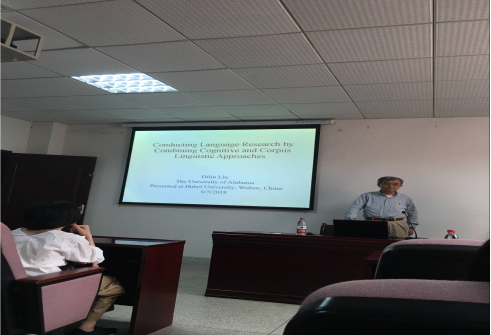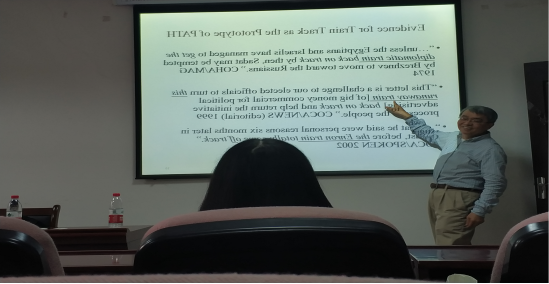2018年6月5日(周二)下午三点,担任美国阿拉巴马大学英语系应用语言学和 TESOL课程的教授和协调人刘迪麟老师在人文逸夫楼A2014学术报告厅为公司师生做了题为“Conducting Language Research by Combining Cognitive and Corpus Linguistic Approaches”的学术讲座。bat365中文版多位骨干教师和英语专业研究生到场聆听。

认知语言学是近些年来研究的热点,而语料库语言学作为现行语言学研究的热门话题,会和认知语言学会有什么联系?刘迪麟教授开门见山告诉我们这次讲座的目的,就是使认知方法和语料库的方法结合起来,不仅让语言研究更具有效度和可信度,还可以让语言学习与教学更加有效和有趣。
为了使大家更够更好地理解两者的关系,刘迪麟教授首先用各种生动形象的例子梳理了传统语言学的重要理论和认知语言学中一些关键理论。在认知语言学中:Language symbolizes our embodied experience.当人们基于自己的经验构建不同的事件时,思维起了非常关键的作用。而语言的结构和使用事实上都是有依据的并非任意的。语言的学习是在语言使用的基础之上的。而语言学习等同于构建学习。因此产生了语言构建习得的三种类型:1.Filled constructions.2.Partially-filled constructions.3. Unfilled constructions.
紧接着刘迪麟老师又介绍了也是基于语言使用的语料库语言学,不仅给语料库语言学下了定义,还为大家讲述了如何使用语料库。在使用语料库时,频数是最为重要的。刘迪麟教授谈到,认知语言学中如果一个语言词条如果使用的频数很高就变成了象征性的构建。认知语言学和语料库语言学有三个共同点:1.Both approaches are usage-based.2.Both consider meaning central in the study of language.3.Both reject the traditional rigid separation of lexis and grammar as two distinct domains.

整场讲座最精彩的地方在于刘迪麟教师基于认知语言学的语料库语言学分析。大量的例子都证明了搭配或者是词组选择都是有依据而并非任意的。如,powerful tea and strong car,make an effort and take a bath,come and go等等。在讲到意象图示时,通过路径来解释词组on track.刘迪麟教授还为我们提供了一个新思路:使用语料库去证实学习语言中出现的错误。由于时间关系,讲座在大家不舍中结束。最后,刘迪麟教授还不忘为大家提供基本参考书目供大家更好的理解此次讲学内容。
刘迪麟教授幽默生动的讲课方式使得整场讲座大家都沉浸在这知识的海洋, 大家钦佩的不仅仅是刘教授的知识广博,更是老师谦虚的态度和流利的口语。讲座后刘老师虽然离场了,但却为大家留下了知识的种子,等待着大家去培育出累累硕果。
专家简介:Dilin Liu is Professor and Coordinator of the Applied Linguistics/TESOL program in the English Department at the University of Alabama, U.S.A. He received his Ph.D. in English from Oklahoma State University. His research and publications focus on grammar and lexis, especially corpus-based description and teaching of grammar and vocabulary; he has also published on other topics, including language and culture, pedagogy, and TESOL teacher education. Liu has been a member of the Editorial Advisory Boards of English Language Teaching Journal (2001-2004), TESOL Quarterly (2005-2008), Reflections on English Language Teaching (2006-2012), and TESOL Journal (2009-), Asian-Pacific Journal of Second and Foreign Language Education (2015-) as well as a reviewer for over twenty applied linguistics journals and publishers, such as Applied Psycholinguistics, Modern Language Journal, Corpora, Corpus Linguistics and Linguistic theory, English for Specific Purposes, Journal of English Linguistics, Journal of Pragmatics, Language and Education, Language Teaching Research, Research in the Teaching of English, System, Cambridge University Press, Palgrave McMillan, and Routledge. He has also been a frequent invited speaker at international conferences and universities in the U.S. and many other countries, such as Cambodia, China, Japan, Singapore, South Korea, and Vietnam.